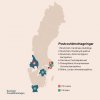mango
Senior Member (Voting Rights)
Opinion piece by Sven Britton (member of the Swedish ME association RME's scientific advisory board) in the journal of the Swedish Medical Association:
ME/CFS-patienter överges när Bragéekliniken läggs ned
https://lakartidningen.se/opinion/d...tienter-overges-nar-brageekliniken-laggs-ned/
ME/CFS-patienter överges när Bragéekliniken läggs ned
https://lakartidningen.se/opinion/d...tienter-overges-nar-brageekliniken-laggs-ned/
Auto-translate said:ME/CFS patients abandoned as Bragée Clinic closes down
On 15 December 2023, the Bragée specialist clinic for ME/CFS (Myalgic Encephalomyelitis/Chronic Fatigue Syndrome), a model clinic in Stockholm in terms of both patient and staff care, came to an end.
I have been working there on an hourly basis as an infection consultant for four years. The clinic has been running for six years and has diagnosed/treated over 3,000 patients with this condition. The Bragée clinic continues, but now with a focus on pain rehabilitation, while ME/CFS patients are referred to regular health centres for the time being. A knowledge centre for post-infectious fatigue has been established at the Infectious Disease Clinic at Karolinska University Hospital in Huddinge, where medical centres can ask questions about ME/CFS, which in at least 50 percent of cases begins with an infection [1]. The region's four academic health centres in Gustavsberg, Jakobsberg, Liljeholmen and Torsplan can also take care of these patients with disabling multiple problems.
This patient group suffers from not being taken seriously by the health care system and the Social Insurance Agency. The lack of an accepted surrogate marker means that the condition is neither classified as a somatic disease nor included in psychiatric criteria. At the Bragée clinic, patients have been helped by a team of doctors, psychologists and physiotherapists and occupational therapists. The clinic has an elaborate treatment programme, including education about the disease and how patients can best help themselves with the support of their families.
There is as yet no single cause of the disease or treatment, nor is one to be expected, as the disease is not uniform but is caused and sustained by various partly unknown factors within and outside the patient. Research on ME is active, not least in the area of stress/infection. The intensive research carried out on long-term disabling fatigue in a certain percentage, mainly women of working age, even after a mild covid infection, can help here [2]. At the Bragée clinic, for example, we have been able to show that ME patients, unlike controls, excrete large amounts of Epstein-Barr virus in saliva in connection with a covid infection [3].
ME can affect both sexes at all ages, but again, women in the age range 20-60 years predominate [4]. A very recent comprehensive national survey in the USA on the prevalence of long-term more or less disabling ME suggests that 1.3 per cent of the population suffers from the disease, mainly women of working age [5]. The disease thus causes suffering for a large number of people and very high costs to society.
It is my hope that ME patients, who now feel lost and abandoned following the closure of specialist clinics in all the country's metropolitan areas, will be respected and recognised by the general health service. This is the important first step towards help and improvement. In many cases, patients are given the universal advice to start exercising ('pull your socks up'), which can be fatal, as the only specific symptom for this group of diseases is severe deterioration from physical exercise, which is otherwise a panacea for most diseases, including psychiatric ones.
The disease has a low status not only among patients but also among doctors, many of whom embrace DN journalist Hanne Kjöller's conclusion that doctors perpetuate the disease and make it worse through various interventions when no treatment is available, because the disease is created in the patients' minds [6]. Doctors and patients are for once on an equal footing: we are both despised, each in our own way. This favours the patient-doctor relationship and facilitates the path to healing.
I hope that interest in helping patients with this difficult and mysterious disease will increase. There are many avenues for research, and I am confident in the region's ambitions to contribute to this.

